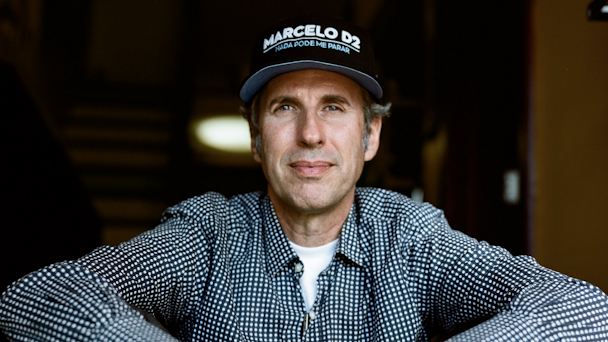‘You’ve got to spice it up’: Beastie Boys’ producer Mario C on audio exploration
Mario Caldato Jr (aka Mario C) knows what sounds good. From producing groundbreaking records with the Beastie Boys or helping propel Jack Johnson to über success, his understanding of creativity within the sonic realm is unquestioned.

Mario C says to capture everything and then learn how to edit yourself
Now, Mario C has joined forces with award-winning production company DaHouse to open its first Los Angeles office. The Drum caught up with Caldato and DaHouse founder Lucas Mayer to discuss what it takes to succeed with sound when working with both bands and brands.
So, there was this band called the Beastie Boys, right? And you were involved with some of their most innovative albums. How did they influence who you are now?
Caldato: I believe we all helped each other expand our musical taste, as we really enjoyed sharing different types of music. Almost every day we would all show up at our studio and bring in lots of old vinyl records and listen for unique sounds and ideas. Then we would explore recording and try to create our own versions or freestyle jams that were maybe inspired by what we heard or liked. It usually never sounded the same but was usually unique in some way or form. So, this daily practice helped me be more open to all types of styles and sounds, which I still really enjoy exploring daily.
Sonically, what were some specific lessons you learned?
Caldato: The most important thing to do is to start capturing stuff. For [the album] Check Your Head, we actually used stuff that was straight from a two-track digital audio tape recorder with two shitty microphones on the ground that was just picking up the vibe of what was going on. We listened to two or three hours of jamming and took out the best 30 or 40 seconds that were those magical moments where we were all like ‘whoa.’
You have to be able to edit yourself. It’s tricky ... I learned that you have to be open-minded and don’t shut out any ideas until you at least try some of them out. It’s about messing around and eventually you will find something that you like and that works, then you just keep building on it. The next step is to make a good quick mix and put it away and then review it later, in different settings. Having some space and perspective really can help you understand what’s working on a track. Sometimes you might need to rearrange or edit the track to make it work better – the structure and arrangement can really make a difference.
And sometimes you have got to spice it up and change things. People were like, you can have a hardcore song and a funky song and a rap song and a rock song together on an album and make it cohesive? We made it work and the fans embraced it. It was a blessing.
What’s the core idea or soul of DaHouse?
Mayer: DaHouse is an audio production collective with the goal of connecting artists across the world to create meaningful music that can be consumed across borders. Our creative process revolves around the innovation of sound. We treat every project like our best artistic composition, stressing over details and carefully choosing every single note.
Congrats on DaHouse’s Titanium Lion last year. What sparked the idea for The Uncensored Playlist?
Mayer: The Uncensored Playlist was born out of frustration over the censorship of news in countries such as Uzbekistan, Egypt and Vietnam. Governments were blocking important news, so DDB Germany found a loophole and invited us to get the truth through.
We met with journalists and musicians to take their articles and turn them into songs under the fake label ROG Music. In March 2018, The Uncensored Playlist was streaming everywhere and, most importantly, was streaming in all the countries where the original articles were blocked.
[Bui Thanh Hieu’s] song When Did Do Dang Die stayed on Amazon Music’s top 10 list for several weeks [and also topped] charts on iTunes the first week of the song’s debut. We ended up making a show in Berlin to release the vinyl. Once we got the news that we couldn’t travel back to those countries we once visited because of the danger of being arrested or deported, we realized that our work reached the right audiences, trespassing all possible borders.
Lucas, tell me about your band, The Client Said No, which performed at Cannes Lions and even toured playing songs no client wanted.
Mayer: We have a huge wardrobe of more than 3,000 songs that we didn’t sell for commercials. We were all together at DaHouse one day and were trying to decide what to play. A friend of mine said, “Let’s play Guns N’ Roses” and I said, “We just had the ‘no’ from Sony Bravia and we have an album. We have to play all the songs from Sony Bravia.” We were in the studio rehearsing and rearranging it and we did an entire album of ‘no’ songs. The first concert we had 300 people here and a guy was like, “Man, Sony didn’t want this? I want it for my commercial.” So, we sold it for Outback [Steakhouse]. I looked at my partners and I said, “We have something.” My wife said, “You already have a name, the client said no,” then everyone [cheered] ... This campaign ultimately highlights a recurring theme throughout DaHouse and our collection: the art of never giving up on creativity.
Well, I bet that never happens to you Mario.
Caldato: There were songs that were held back for one reason or another. There was one song on Jack Johnson’s In Between Dreams album where I was sure it was in the top three of our writing and Jack was like, “I don’t know.” He was a little skeptical and it was put on the back burner. Then he was asked to work on the Curious George movie soundtrack and he needed a song. The song [Upside Down], which was a leftover from his last album, ended up being one of his biggest songs.
[The moral is to] keep all of those old ideas. Don’t chuck them. It may be just missing that one spice or one element – or maybe it’s just the timing. Timing has a lot to do with everything too. You can present the same idea two years later and they’ll be like, that’s fantastic.
There’s a famous lyric in Intergalactic about your cleanliness. Do you still like to keep it clean?
Caldato: Well, yes. I do still like to keep certain things clean, around the studio and home, but musically I like to keep it looser and rougher around the edges, more organic and raw, personally. I was known to keep the studio tidy so Mike Diamond wrote a rhyme about me, that’s how it came to be. I’m very thankful for that.

